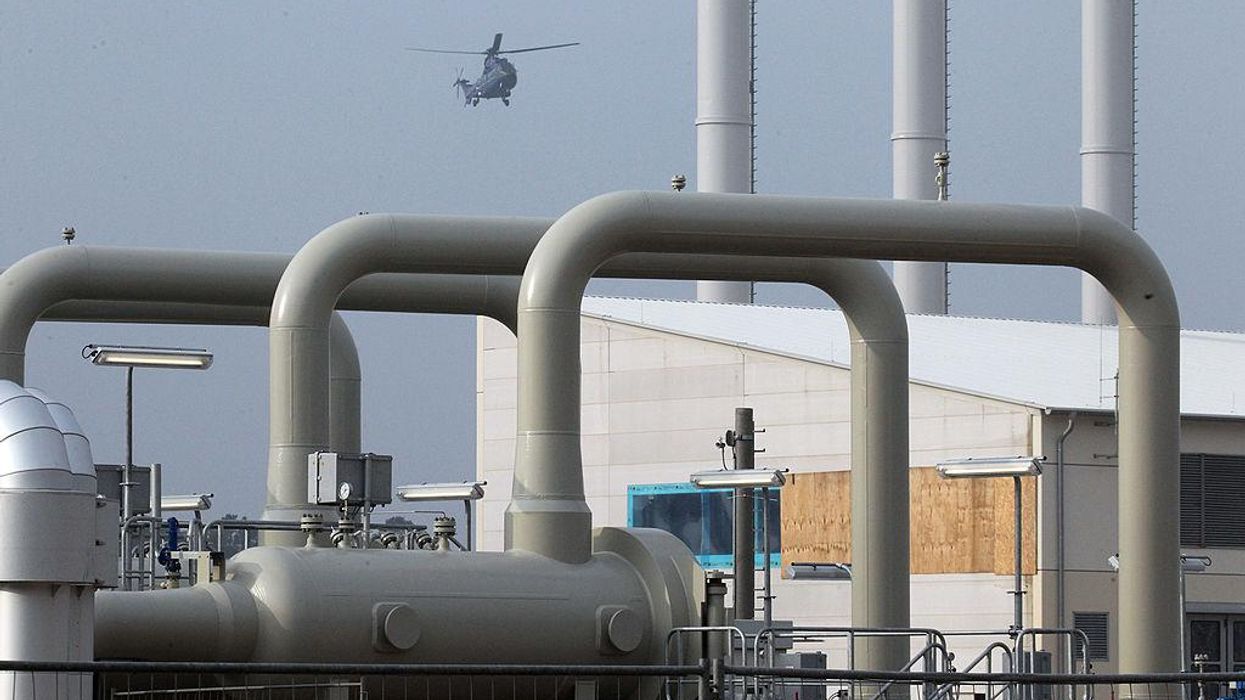
Photo by Sasha Mordovets/Getty Images

Two Russian natural gas pipelines into Europe, Nord Stream 1 and Nord Stream 2, have both experienced leaks near Sweden and Denmark. The leaks, which Denmark's Prime Minister Mette Frederiksen indicated were "hard to imagine" as coincidences, occurred within hours of one another.
The first leak is suspected to have occurred overnight and was detected early Monday in the NS2 between Russia and Denmark.
Reuters reported this to have occurred within a day of the Tuesday launch of the Baltic Pipe, which will carry gas from Norway to Poland — part of a European effort to wean off of Russian supply. At its inauguration, Frederiksen suggested that the Baltic Pipe would help "remove energy as a Russian instrument of power."
Two additional leaks were reported later on the NS1, northeast of the Danish island Bornholm, after the pipeline operator indicated a pressure drop. According to the Swedish Maritime Administration, one of the leaks was in the Swedish economic zone and the other in the Danish economic zone, close to one another.
Network operator Nord Stream AG stated that the "destruction that occurred on the same day simultaneously on three strings of the offshore gas pipelines of the Nord Stream system is unprecedented," noting that it is not yet clear how long it will take to restore the infrastructure.
The pipelines were not in operation at the time of the leaks, although they nevertheless contained gas under pressure.
The Kremlin-controlled energy company Gazprom suspended gas flow to Europe via the NS1 in late August, citing technical difficulties allegedly caused by Western sanctions. In 2021, Europe imported an estimated 155 billion cubic meters of fuel from Russia, 35% of which came by way of the NS1.
The NS2, on the other hand, has yet to begin commercial operations. They were delayed indefinitely ahead of Russia's invasion of Ukraine.
Upon learning of the leaks, Denmark restricted shipping in a five-nautical-mile radius around the area. A no-fly zone is also reportedly in effect.
An investigation into the cause is under way.
Below is footage of the gas leaks in the Baltic Sea shared by the Twitter account for Denmark's Armed Forces.
Although the Danish Ministry of Climate, Energy and Utilities suggested, "It is too early to say anything about the causes of the incidents," suspicions of sabotage are mounting.
Kristoffer Bottzauw, who heads the Danish energy agency, emphasized that "breaches of gas pipelines happen extremely rarely."
One European security source told Reuters, "There are some indications that it is deliberate damage," begging the question, "Who would profit?"
Russia, which has used the power it exports to maintain some political leverage over Europe, indicated the leak was cause for concern. Dmitry Peskov, a Kremlin spokesman, suggested, "No option can be ruled out right now."
Polish Prime Minister Mateusz Morawiecki explicitly called the leaks the result of "sabotage, related to the next step of escalation of the situation in Ukraine."
According to Der Tagesspiegel, one German government source indicated he or she "can't imagine a scenario that isn't a targeted attack. Everything speaks against a coincidence."
Politico's Jakob Hanke Vela said other German officials suspect the leaks were intentional.
These pipelines and the energy they have up until recently supplied Europe with have been the subject of much debate during Russia's war on Ukraine.
Various activists have protested the pipelines' construction and maintenance over the years. For instance, in May 2019, activists occupied a Nord Stream building site in northern Germany, protesting the line's construction.
Political leaders, including former President Donald Trump, have similarly criticized the pipelines, in many cases calling for them to be sanctioned, citing the geopolitical leverage they provide to Russia.
Ukraine has vehemently opposed the Nord Stream 2 pipeline, both before and after the Biden administration ended its opposition to its Russian completion.
This year, Biden pivoted, indicating in vague terms that he might "bring an end" to Nord Stream 2.
Europe finds itself in an energy crisis. People are stocking up on firewood in Eastern Europe. European governments are now considering introducing energy rationing this winter, with the EU having already asked member nations to reduce gas consumption by 15%.
Russian president Vladimir Putin suggested earlier this month that he may leave Europe to "freeze," saying, "We will not supply anything at all if it contradicts our interests. ... We will not supply gas, oil, coal, heating oil — we will not supply anything."
In light of the Nord Stream leaks, even if Russia were to reverse its tack and diplomacy were to prevail, it is unclear whether it will be a matter of days, weeks, or months to restore the pipelines and westward energy flow.